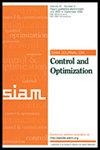Exponential Stability for a Class of Discrete-Time Switched Systems and Its Applications to Multiagent Systems
IF 2.4
2区 数学
Q2 AUTOMATION & CONTROL SYSTEMS
引用次数: 0
Abstract
SIAM Journal on Control and Optimization, Volume 62, Issue 2, Page 1165-1182, April 2024.Abstract. This paper studies the exponential stabilization problem for a class of discrete-time linear switched systems arising from establishing the output-based distributed observer and the output-based adaptive distributed observer for discrete-time linear leader systems over jointly connected switching networks. The existing results on distributed observers and adaptive distributed observers are state-based in the sense that they need to make use of the full state of the leader system, which is quite restrictive since, in many applications, only the output of the leader system is available. As an application, the output-based distributed observer is used to solve a leader-following consensus problem for discrete-time linear multiagent systems by distributed output feedback control.
一类离散时间切换系统的指数稳定性及其在多代理系统中的应用
SIAM 控制与优化期刊》第 62 卷第 2 期第 1165-1182 页,2024 年 4 月。 摘要本文研究了一类离散时间线性交换系统的指数稳定问题,该问题产生于为联合连接交换网络上的离散时间线性领导系统建立基于输出的分布式观测器和基于输出的自适应分布式观测器。关于分布式观测器和自适应分布式观测器的现有结果都是基于状态的,即它们需要利用领导者系统的全部状态,而这是相当有限制性的,因为在许多应用中,只有领导者系统的输出是可用的。作为一种应用,基于输出的分布式观测器被用于通过分布式输出反馈控制来解决离散时间线性多代理系统的领导者-跟随者共识问题。
本文章由计算机程序翻译,如有差异,请以英文原文为准。
求助全文
约1分钟内获得全文
求助全文
来源期刊
CiteScore
4.00
自引率
4.50%
发文量
143
审稿时长
12 months
期刊介绍:
SIAM Journal on Control and Optimization (SICON) publishes original research articles on the mathematics and applications of control theory and certain parts of optimization theory. Papers considered for publication must be significant at both the mathematical level and the level of applications or potential applications. Papers containing mostly routine mathematics or those with no discernible connection to control and systems theory or optimization will not be considered for publication. From time to time, the journal will also publish authoritative surveys of important subject areas in control theory and optimization whose level of maturity permits a clear and unified exposition.
The broad areas mentioned above are intended to encompass a wide range of mathematical techniques and scientific, engineering, economic, and industrial applications. These include stochastic and deterministic methods in control, estimation, and identification of systems; modeling and realization of complex control systems; the numerical analysis and related computational methodology of control processes and allied issues; and the development of mathematical theories and techniques that give new insights into old problems or provide the basis for further progress in control theory and optimization. Within the field of optimization, the journal focuses on the parts that are relevant to dynamic and control systems. Contributions to numerical methodology are also welcome in accordance with these aims, especially as related to large-scale problems and decomposition as well as to fundamental questions of convergence and approximation.

 求助内容:
求助内容: 应助结果提醒方式:
应助结果提醒方式:


